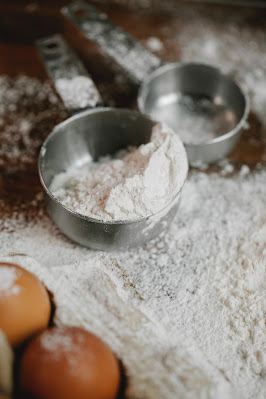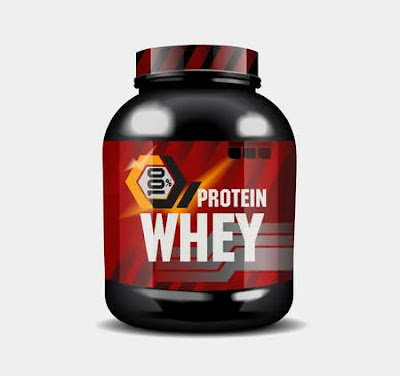
Protein powder is a food product made from sources, both animal
and plant-based, that are isolated from source proteins and processed into a
powdered product. It is typically produced for dietary purposes. The whey
protein is the protein from the watery part of the milk that separates from the
yogurt when making cheese. It is commonly used as a protein supplement. The
same protein can improve the nutrients in the diet and also has an effect on
the immune system. People generally use the same protein to improve athletic
performance and increase strength. Whey protein is also used for asthma,
diabetes, weight loss and many other conditions, but there is no good
scientific evidence for most of them. The majority of protein powder is created
from casein protein, which is the most common type of protein in the world, and
whey protein, which is the second most common. Both contain a range of
different types of protein, including casein protein, whey protein, milk
protein, and egg protein.
Protein powder is often referred to as an “extra protein” or an
“excellent source of protein.” This means that it is a food that is especially
high in the protein quantity and quality that are important to athletes who
want to fill their plates with high-quality protein.
Downside of Protein
Protein supplement or protein bar comes in a variety of flavors, from vanilla and chocolate to green tea and coffee. Although the protein powder has an excellent nutrition profile, it can also be addictive and lead to a cravings for more. The powders may include other ingredients such as added sugars, artificial flavoring, thickeners, vitamins, and minerals. The amount of protein per scoop can vary from 10 to 30 grams. Supplements used for building muscle contain relatively more protein, and supplements used for weight loss contain rather less protein.

Protein powder is simply protein from Different sources, which can be found in a number of health and supplement products. It can be purchased in most health food stores in food stores in your local area. It is an excellent choice for vegetarians and vegans who want to get their protein without compromising their health and well-being, and who want a natural source of protein. Protein powder is a complete protein, meaning it has all 9 essential amino acids in it, unlike incomplete proteins like the ones found in a typical grain-based product.
Protein powder, also called protein isolate, is primarily a dry powder made from protein-based ingredients and is one of the most popular supplements on the market today. Protein powder is excellent for building muscle, promoting muscle growth, and helping you to achieve a leaner, stronger, healthier body.
Daily protein Supplementation
The suggested Dietary prerequisite for protein intake is 56 grams for men and 46 grams per day for women while this may wary for Athletes as based on their activity level. For example:
- An egg provide 6 grams
- 6 ounces of Greek yogurt contains 18 grams
- A handful of nuts contain 4–7 grams
- A cup of milk has 8 grams Protein
- 2 ounces of cooked chicken comprise 14 grams
Composition of Proteins
Protein Concentrates:
Protein concentrates for consumers are made by a wide variety of companies, but are all commonly created using various types of protein from animal sources. Animal protein, such as beef, lamb, and chicken, is a popular choice of protein source for the health conscious. Plant protein, such as soy or pea, is also used, as it is high in protein and iron, and is a good alternative to animal protein. All of these animal protein sources contain protein, as well as other nutrients and healthful fats, and can provide significant protein and iron.
The protein concentrates are made from isolated proteins that are grown in a lab. You usually see three types of protein concentrates — whey protein, soy protein, and casein protein.
Casein protein is made from milk protein and contains all the protein you need, so it’s great for building muscle and staying lean. Casein is also a great source of calcium, riboflavin, vitamin B12, and almost all the essential amino acids. Concentrated proteins are also a great way to sneak vegetables into your diet because they contain little
Protein Isolates:
Protein isolates, commonly referred to as whey protein, are the solids that are left after milk is removed to separate out the casein. This kind of protein is especially useful if you need the extra protein but can’t or don’t want to eat dairy.
We like that protein isolates, such as those from whey and casein, are a great source of high-quality protein, and provide a nice boost in the amino acids you need to stay lean. And, because they’re made from a pure, isolated protein source, protein isolates are typically much better digested than other protein sources, so they’re a great choice if you’re looking for a quick post-workout shake. Protein isolates are a great way to get high-quality protein without the fat
Protein Hydrolysates:
Protein hydrolysates are a type of protein that has been broken down into individual amino acids. This process is called hydrolysis.
Protein hydrolysates are made by chemically or enzymatically breaking down a protein into smaller fragments, or peptides. Protein hydrolysates are made by breaking down proteins, which are the building blocks that make up muscle, skin, and connective tissue, into smaller molecules. These smaller molecules are more easily broken down and absorbed by our bodies, so they can provide us with more of the protein we need. They generally have lower levels of fat and more of the essential amino acids than whole proteins do, making protein hydrolysates a great alternative for those who want to avoid high levels of fat but want to get more protein in their diet.
The Five Best Types of Protein Powder
Protein powder is one of the most important protein supplements in existence, but there are many different types of protein powder to consider when choosing which type is right for you.
Here are the 5 best types of protein powder.
Protein powder is a great way to get an extra boost of protein in your diet. They come in different flavors, from chocolate to vanilla, and are also fortified with healthy nutrients. Some of the leading brands include ON and Muscle Tech.
Protein powder is a complete protein, meaning that it contains all 9 essential amino acids in it, which are the building blocks of protein. Protein powders are a great way to get in some high-quality protein without having to think too much. We want to help you make the best choice, so until now, we’ve only been able to offer general guidelines based on our research, conversations with experts, and the experience of our customers. But now, we’re going to put together a more thorough and informative guide to help you make the best choice.
1. Whey Protein
Whey protein comes from milk. It is the liquid that separates from the curds during the cheese making process. It’s high in protein but also harbors lactose, a milk sugar that many people have difficulty digesting.
While whey protein concentrate retains some lactose, the isolate version contains very little because most of this milk sugar is lost during processing.
Whey digests quickly and is rich in branched-chain amino acids (BCAAs). Leucine, one of these BCAAs, plays a major role in promoting muscle growth and recovery after resistance and endurance exercise. As a source of high-quality protein, whey protein is a great option. It is high in protein, has fewer calories than other protein sources, and is a great source of vitamins and minerals.
Whey protein concentrates are derived from milk. They are typically sold in a powder form and are derived from pasteurization, which retains the nutritional content and the protein-to-fat ratio of the raw material.
There are now many brands of whey protein powder, some of which are great tasting, some aren’t. I recommend choosing one that is high quality and on sale (for example, Kefir Walnut, or Newman’s Own Premium). Good brands will have a third-party lab test and a 1-800 number on their packaging that you can call for information on their ingredients, nutrition, and quality. Look for “organic,” “gluten-free,” or “vegan” on the label.
Whey Protein is extracted from milk by a process called “frothing”. It is a byproduct of the cheese-making process. It can also be produced artificially or by fermentation. In the United States, the most common type of “frothing” is done through a method called “rennet”.
Made from milk, casein is a milk protein which is about 80% casein and 20% whey, which is digested and absorbed much more slowly. It is commercially used to make food and beverages which are similar in texture to natural casein, such as cheese, ice cream, and yogurt. Casein is also referred to as "milk protein concentrate
It is a white, granular, or flaky material. It has a solid structure similar to casein but is made from different proteins. It is rich in calcium and phosphorus. It also contains valuable vitamins including B~12~, A, D, E, and K.
When Casein interacts with stomach acid, it forms a gel, slowing down stomach and Make amino acid to absorb in delayed fashion. This results in a steady flow and reduced rate of muscle protein breakdown. Research indicates that casein is more operative at increasing Protein than soy and wheat protein
However, studies done on in overweight men suggests that when calories are restricted, casein may have an benefit over whey in improving body composition during resistance training
3. Egg Protein
Egg protein is the most abundant protein in eggs. It makes up about half of the white, yellow, and albumen of an egg. The other half is made up of globin and other proteins. Globin is what gives blood its red color and is also used to make blood plasma, the liquid part of blood.
Egg protein is the richest known source of complete protein. It contains all of the essential amino acids needed to build and repair muscle tissue, and it's an excellent source of dietary calcium and vitamins. It's also a good source of dietary fiber, which has been shown to help regulate cholesterol levels and reduce the risk of heart disease. Egg protein is an excellent protein source for people on a vegetarian or vegan diet, those looking to increase their protein intake, and people with allergies or sensitivities to other types of protein.
The world is obsessed with eggs. The majority of Americans eat them every day, and companies large and small produce them in nearly every way imaginable. The eggs we eat are often produced by hens that are raised on industrial farms, where thousands of birds are confined to tiny cages ice metal pails. They are fed corn and soybean meal, antibiotics and growth hormones. Eggs are a superb source of high-quality protein and have the highest protein digestibility-corrected amino acid score (PDCAAS) which is a measure of a protein’s quality and digestibility. Eggs helps you with your appetite, decreasing it by making you full for longer time
However, Egg protein powders are only made from egg whites not whole eggs even if the protein quality remains excellent, but you will not feel the fulfilment as of eating a whole egg because the high fat yolk part that has been removed.
Egg-white protein could be a good alternate for people with dairy allergies who favor supplementing on animal protein.
4. Pea Protein
Pea Protein is found in several kinds of legumes such as peas. It is high in protein and provides a complete protein source. It’s also important in the prevention of heart disease. Peas are considered a superfood.
It’s made by simply sprouting and soaking the peas, and then thoroughly washing them. Then, the pea protein is dried and milled into flour, and packed into an air-tight container. The price of pea protein has dropped dramatically in the last decade, and it is now widely available.
Pea protein powder is common among vegetarians and people with allergies or sensitivities to dairy or eggs.
It’s made from the yellow split pea, a high-fiber legume that boasts all but one of the essential amino acids. Pea protein is also the source of BCAAs.
A lab study in rats revealed that pea protein is between whey protein and casein in terms of absorption. It has the ability to activate the release of several fullness hormones and may be comparable to that of dairy protein.
In a another 12-week study in 161 men doing weight training, those who took 50 grams of pea protein daily experienced similar increases in muscle thickness as those who used up the same amount of whey protein daily
In addition, a study revealed that it also helped lowering the blood pressure in humans and rats, when they took pea protein supplements.
5.
Brown Rice Protein
New research is found out that brown rice is the best-tasting and most nutritious type of rice for anyone trying to gain or maintain muscle. It also has the lowest Glycemic Index, which means it causes the least amount of blood sugar spikes. This is especially beneficial for people with diabetes who need to keep their blood sugar under control. And while white rice is often refined and lacks the fiber, antioxidants, and other nutrients found in brown rice, it is also much higher in calories, cholesterol, fat, and sodium.
Rice protein is a widely available, inexpensive source of high-quality protein that is great for building muscle and losing weight. Of all the different types of protein, rice protein is the most high-quality since it is the only complete protein source that is considered to be a perfect protein by the Food and Drug Administration (FDA) -- perfect in that it contains all of the essential amino acids.
Rice protein is an excellent source of iron, zinc and B vitamins aswell.
Protein powders made from brown rice have been discovered recently, but they are supposed to be lower than whey protein for building muscle, While rice protein contains all of the essential amino acids, it is very low in lysine.
There isn’t a lot of investigation on rice protein powder, but one study compared the effects of rice and whey powders in fit, young men. This study demonstrated that taking 1.7 ounces (48 grams) of rice or whey protein daily resulted in similar changes in body composition, muscle strength and recovery
Different types are helpful depending on different goals like Weight Gain or Fat Loss etc.
For Weight Loss the
Casein protein, whey protein or a combination of the two may be the best protein supplement as they provide a feel of fullness and curb your need to munch on unhealthy snacks. Through For Muscle Gain studies has consistently confirmed whey protein’s ability to
encourage muscle mass and recovery. Although whey concentrate is cheaper than whey isolate, it contains less protein by weigh














0 Comments